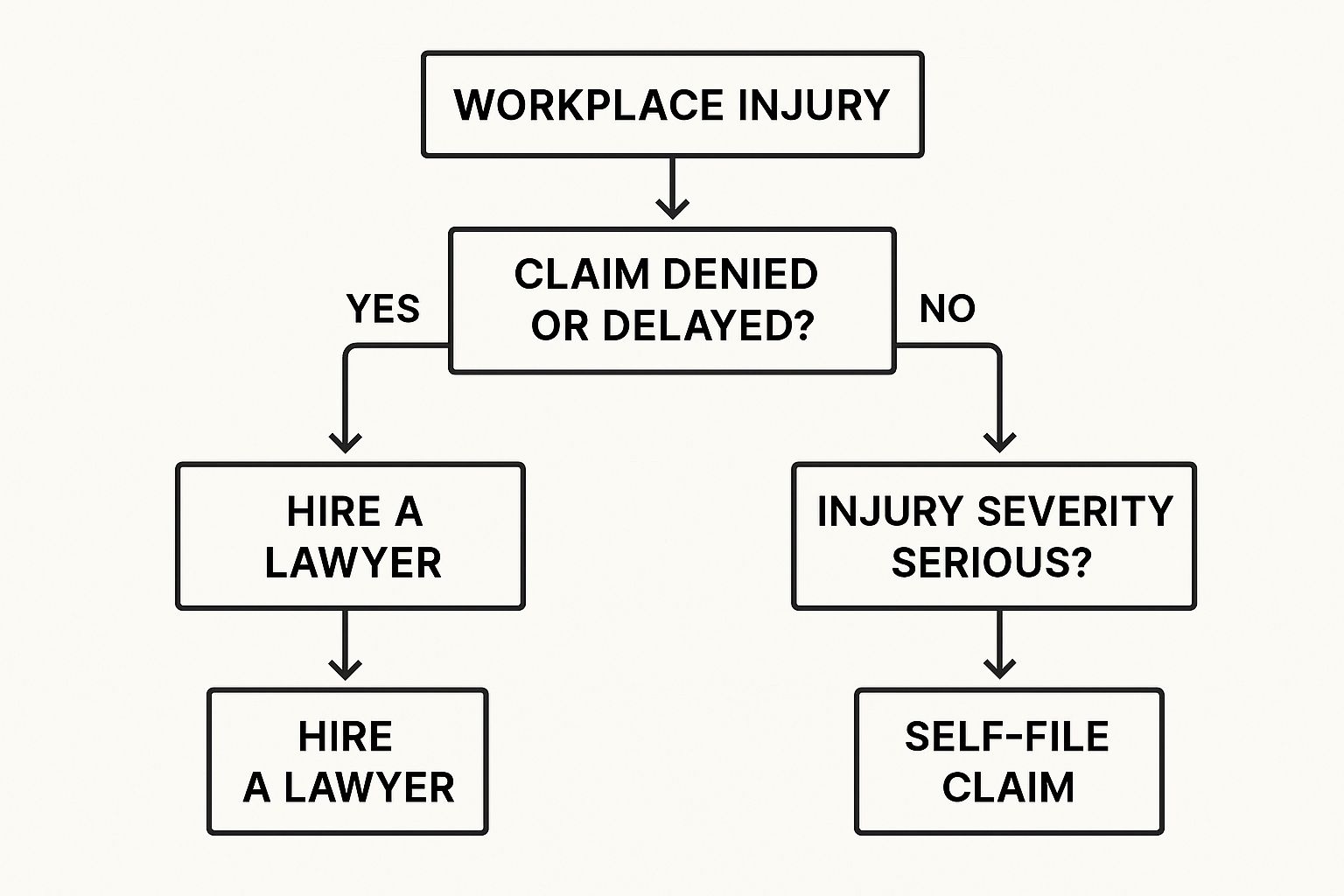When to Hire a Workers Comp Lawyer in Oregon
"I was satisfied once John Bell took over my case."
"Communication was always timely."
When to Hire a Workers Comp Lawyer in Oregon
Knowing when to bring in a lawyer can feel like a tough call, but certain situations are clear signals that you need professional help on your side. If your claim gets denied, the insurance company starts dragging its feet on payments, your injury is serious enough to require surgery, or your boss is fighting your claim, it's time to lawyer up. These aren't minor hiccups; they are major red flags that your benefits are at risk.
Clear Signs You Need a Workers Comp Lawyer
Think of the Oregon workers' comp system as a path. For a simple, undisputed injury, that path is a straight, paved sidewalk. You can probably walk it on your own without much trouble. But when your claim is denied or your injury is severe, that path turns into a winding, treacherous trail through a dense forest. That's when you need an experienced guide—an attorney—to make sure you don't get lost.
A lot of injured workers I've talked to are hesitant to call a lawyer. They worry about the cost or assume it will make things more complicated. In reality, waiting too long is often the biggest mistake you can make. Insurance companies have entire teams of adjusters and lawyers whose job is to protect the company's bottom line by paying out as little as possible. The moment you start feeling resistance, you can be sure they're looking out for their interests, not yours.
When Legal Guidance Becomes Essential
Some scenarios are so stacked against the injured worker that going it alone is a huge gamble. The power dynamic shifts dramatically in the insurer's favor, and you need someone in your corner to level the playing field.
You should seriously consider getting legal help if you find yourself in any of these situations:
- Your claim is flat-out denied. A denial letter feels final, but it’s really just the start of a formal appeals process. Winning that appeal without deep legal knowledge is incredibly difficult.
- The insurance company is delaying your benefit checks. Stalling isn't just an accident; it's a common tactic to put financial pressure on you, hoping you'll give up or accept a lowball settlement out of desperation.
- Your injury requires surgery or leaves you with a permanent impairment. These cases are complex. They involve calculating future medical needs and lost earning capacity for years to come, and insurance adjusters are trained to minimize those projections.
- Your employer is disputing your claim. If your boss argues the injury didn't happen at work, the burden of proof is on you. An attorney knows exactly what kind of evidence is needed to connect your injury to your job.
This image helps break down the decision-making process, highlighting the critical points where an attorney becomes essential.

As you can see, a denied claim or a severe injury are two of the biggest forks in the road. If you hit either of these, your next call should be to an experienced workers' comp attorney.
To make it even clearer, here’s a quick-glance table summarizing the most common scenarios where you need to bring in a professional.
Key Signs You Need to Hire a Workers Comp Lawyer
| Claim Denial | Navigating the complex appeals process requires legal expertise to meet deadlines and present a strong case. | You could permanently lose your right to all benefits, including medical care and wage replacement. |
| Delayed or Stopped Payments | An attorney can challenge the insurer's tactics and force them to pay the benefits you're owed on time. | You could face severe financial hardship while the insurer holds your benefits hostage. |
| Serious Injury or Surgery | Your case involves long-term medical care and potential permanent disability, which insurers are trained to undervalue. | You might accept a settlement that doesn't cover your future medical bills or lost earning capacity. |
| Employer Dispute | You need to gather specific evidence (witnesses, medical records) to prove your injury is work-related. | Your claim could be denied from the start, leaving you with no coverage for your injury. |
| Pre-existing Condition Mentioned | Insurers often use prior injuries as an excuse to deny a valid new claim. A lawyer can fight this. | The insurer might successfully (and unfairly) blame your new injury on an old one, denying all benefits. |
If any of these situations sound familiar, don't wait. The insurance company already has its legal team ready, and you deserve to have an expert fighting for you, too.
What to Do When Your Claim Is Denied
Getting that denial letter in the mail can feel like a gut punch. It’s disheartening, and it’s easy to think your fight is over. But I’m here to tell you that it’s not. In fact, a denial is often just the beginning of the real process.
This is the point where the insurance company officially challenges your right to benefits, kicking off a formal appeals process. Trying to navigate this alone is like trying to argue a court case without a law degree—you're up against professionals who do this every single day.
Insurance companies have a playbook. They often deny perfectly valid claims based on what look like small issues: a missed deadline, a form that wasn't filled out just right, or their classic argument of "insufficient medical evidence" to connect your injury to your work. A seasoned workers' comp attorney knows these tactics inside and out. They aren't roadblocks; they're just hurdles we know how to clear.

Understanding the Appeals Process
Think of your initial claim as filling out an application. The appeal, however, is a whole different ballgame. It's a formal legal proceeding where you have to prove your case. Without a lawyer, you’re walking into a complex debate armed with a folder of paperwork, while the other side has a team of experts ready to pick it apart.
An attorney’s job is to take that folder and build a powerful, evidence-backed argument that forces the insurer to defend its denial.
The Oregon workers' compensation system is a maze of strict rules and unforgiving deadlines. The first step is usually a request for reconsideration, and if you miss that window, you could lose your right to benefits for good. An attorney's first priority is to make sure every T is crossed and every I is dotted, protecting your claim from being thrown out on a technicality.
A denial might feel final, but it’s often a strategic move by the insurer. An appeal, handled correctly, shifts the power back into your hands by forcing them to justify their decision with concrete evidence before an administrative law judge.
Turning a Denial Into an Approval
Here’s a statistic that should give you hope: a huge number of claims that are initially denied get overturned on appeal. Studies have shown that somewhere between 50% and 65% of appealed claims ultimately result in the injured worker getting benefits. The odds get even better when you have an expert in your corner. Injured workers who hire an attorney are far more likely to win their appeal than those who go it alone.
So, how does a lawyer make this happen?
- Gathering Compelling Evidence: We don't just resubmit the same paperwork. We work with your doctors to get detailed medical opinions that directly counter the insurer's reasons for the denial.
- Handling All Communications: Once you have a lawyer, the insurance adjuster has to go through them. This prevents you from accidentally saying something that could be twisted and used against your case.
- Representing You at Hearings: If your case goes to a formal hearing, your attorney will be there to present your case, question the insurer's witnesses, and make the legal arguments needed to win.
It can be helpful to read up on common insurance claim denial reasons, as you'll see a lot of the same tactics used in workers' comp. Getting a handle on the basic workers' comp claim process also gives you valuable context.
Bottom line: a denial is your cue. It’s the clearest sign there is that it’s time to bring in a professional to fight for the benefits you deserve.
When Your Injury is Serious or Complicated
Let's be honest, not every work injury is a minor cut or bruise that's forgotten in a couple of weeks. Sometimes, an injury is life-altering. We're talking about situations that require surgery, leave you with a long-term or permanent disability, or make it impossible to ever go back to your old job.
When that happens, your entire workers' comp claim transforms. The stakes get incredibly high, fast.
These aren't just about getting a few medical bills paid. A serious injury claim forces you to think about—and fight for—your entire future. It involves complex, often contentious, calculations about future medical treatments, the wages you'll lose over a lifetime, and the official rating of your permanent disability. You can bet the insurance adjuster is trained to pick apart every single one of those calculations to save their company a buck.
Think of it like this: for a sprained wrist, you might be able to handle the claim yourself. It's a simple repair. But for a severe injury, it's like trying to rebuild a house after a fire. You wouldn't tackle that without a structural engineer and a crew of professionals. Don't try to rebuild your life with a complex injury claim without the expertise of a seasoned workers' comp lawyer.
Protecting Your Financial Future for the Long Haul
A good attorney does so much more than fill out forms. They become your champion, your strategist, and your shield, making sure your final settlement truly accounts for the lifelong impact of your injury. For severe and complex claims, like those involving persistent neck pain after an accident, getting the full medical story right is absolutely critical to getting fair compensation.
Here's where a lawyer really makes a difference in these tough cases:
- Calling in the Experts: They have a network of medical and vocational specialists who can provide powerful, credible evidence about your future medical needs and what kind of work you can (and can't) do.
- Calculating the True Cost: They know the formulas and legal precedents to accurately value your entire claim. This isn't just about today's bills; it's about future wage loss and ongoing care, so you aren't left financially stranded down the road.
- Fighting the Insurance Company: They take over all the stressful communications and negotiations. When the insurer comes in with a lowball offer, your lawyer is ready to counter with a well-supported argument built on facts and the law.
The proof is in the numbers. Lawyers who focus on specific complex injuries often have impressive track records: a 92% success rate for repetitive strain injuries, 89% for construction accidents, and a staggering 95% for equipment-related injuries. These statistics aren't just numbers; they show that hiring an attorney with experience in your type of injury can dramatically shift the odds in your favor. You can learn more about these success rates and what they mean for your case.
When your ability to work and live normally is on the line, the insurance company will bring its best team to the table. Hiring a workers comp lawyer ensures you have an expert fighting just as hard for you, protecting your right to a secure future.
Responding to Pushback From Your Employer or Their Insurer
Sometimes, the toughest part of a work injury isn’t the physical recovery. It’s the fight you face from your employer or their insurance company. When you start feeling that resistance, it's a critical moment—the point where hiring a workers' comp lawyer goes from being a good idea to an absolute necessity.
Think about it: the insurance company has a whole team of professionals whose entire job is to protect their company's bottom line. When they start pushing back on your claim, it’s a clear signal that their financial interests are their priority, not your health. You need an expert in your corner, fighting just as hard for you.
Common Pressure Tactics from Employers
Your boss might not be openly hostile, but some of their actions can be major red flags. Be on the lookout if your employer starts disputing how the accident happened, downplaying how badly you were hurt, or nudging you to come back to work before your doctor says you're ready. These are classic signs they're trying to minimize the claim from the get-go.
And then there's retaliation, which is a whole other level of serious. It is completely illegal for your employer to fire you, demote you, or slash your hours simply because you filed a workers' compensation claim. If you notice any of these things happening after you get hurt, it's time to call an attorney. Immediately.

Recognizing Insurance Company Strategies
Insurance adjusters are trained professionals, and they often follow a specific playbook designed to pay out as little as possible. Knowing their tactics is the first step to protecting yourself.
- Delaying Payments: Suddenly, your paperwork is "lost," or they're endlessly "waiting for more information." It's a stall tactic, and they’re hoping the financial pressure will force you to take a lowball settlement just to get by.
- Denying Necessary Treatments: Your doctor recommends a specific surgery or physical therapy, but the adjuster refuses to approve it, claiming it’s not related to your work injury. They are essentially trying to practice medicine without a license.
- Offering a Quick, Low Settlement: You might get an offer for a lump-sum payment very early on, often before you and your doctor even know the full extent of your injuries. This offer is almost always a fraction of what your claim is truly worth.
An insurance company's first offer is rarely their best one. It’s a negotiation tactic, a feeler to see if you know what your claim is really worth. A lawyer completely changes the dynamic, showing them you're serious about getting a fair outcome.
Bringing in an attorney puts a stop to these pressure tactics. They take over all the communication, fielding the aggressive phone calls and handling the endless paperwork. This frees you up to focus on what actually matters: your health. Instead of being stressed and bullied into a bad deal, you can rest easy knowing your case is being handled by an expert.
Understanding the True Value of a Lawyer
For most folks who get hurt on the job, one of the first questions that pops into their head is, “Can I even afford to hire a lawyer?” It’s a completely fair question, but it’s usually rooted in a common misconception about how workers' comp attorneys get paid.
The system is actually designed to give you access to expert legal help without having to worry about upfront costs.
In Oregon, nearly all workers' compensation lawyers work on what's called a contingency fee basis. Plain and simple, this means you don’t pay a dime out of your own pocket. The attorney’s fee is just a percentage of the benefits they successfully win for you, and that percentage is capped by state law. If they don't win your case, you owe them nothing.
This shifts the whole decision-making process. It’s no longer about whether you can afford a lawyer; it’s about the incredible value they can bring to your claim. Think of it less as an expense and more as a strategic investment in your own recovery and financial stability.
The Real Cost of Going It Alone
It might feel like you're saving money by handling your own claim, but that's rarely how it plays out. In fact, going it alone can end up costing you dearly in the long run.
Insurance companies are well aware that injured workers who don't have a lawyer are often unfamiliar with the system, their rights, and what their claim is actually worth. This can lead to quick, lowball settlement offers that look tempting at first but leave you high and dry when it comes to covering future medical bills or making up for lost income.
Hiring an experienced attorney completely changes the dynamic. They know the insurance company’s playbook inside and out and have the legal expertise to fight back effectively. Just having a lawyer on your side sends a powerful signal that you won't be pushed around and are serious about getting the full compensation you deserve.
Hiring a Lawyer A Cost-Benefit Analysis
Let’s be honest, the idea of paying a fee can be intimidating. However, when you step back and look at the potential outcomes, the value of having a professional advocate becomes crystal clear. An attorney isn't just filing paperwork; they are actively working to maximize your benefits and protect your future.
Here’s a practical look at what that difference often means for an injured worker:
| Settlement Amount | Often accept the first low offer from the insurer. | Negotiates for the maximum value based on all benefits. |
| Medical Treatment | May struggle to get necessary treatments approved. | Fights to ensure all required medical care is covered. |
| Claim Complexity | Easily overwhelmed by deadlines and legal procedures. | Manages all legal complexities and deadlines for you. |
| Communication | You are responsible for all calls with the insurer. | Acts as a professional buffer between you and the insurer. |
| Peace of Mind | High stress and uncertainty about the claim's outcome. | Confidence that an expert is protecting your interests. |
At the end of the day, an attorney’s fee is a small price to pay for securing a settlement that truly covers your needs—not just today, but for years to come.
A Look at the Financial Impact
The numbers don't lie—having a legal professional in your corner can make a staggering difference. While a claim might sometimes take a bit longer with a lawyer involved, the financial results are almost always worth the wait.
Shocking research shows that having an attorney can increase the median claim value by a massive 739%. Even after legal fees, the net amount you walk away with is often significantly higher. You can see more about these workers' comp case findings on Atticus.com.
This isn't just about a bigger check. It's about getting the resources you and your family need to get through a difficult time without facing a financial catastrophe. A fair settlement means you can pay for all your medical care, replace your lost wages, and focus on what truly matters: healing.
To get a better handle on everything that's on the line, take a look at our guide on what workers' compensation benefits cover. It breaks down the different types of support you’re entitled to.
Ultimately, bringing in a lawyer is about protecting your rights and making sure you receive every single dollar the law says you're owed. It’s an investment in your health, your peace of mind, and your long-term security.
When Should You Call an Attorney About Your Claim?

In a workers' comp claim, timing can make all the difference. So, when is the right moment to pick up the phone and call a lawyer? The short answer: as soon as you hit a major roadblock.
This often happens when you receive a formal claim denial or feel pressure from your employer to get back on the job before your doctor says you're ready.
Think about it from this perspective: the insurance company has its team of legal experts working on your case from the very beginning. If you wait to get your own expert on board, you’re starting the process at a serious disadvantage.
The Power of an Early Consultation
Most workers' compensation attorneys in Oregon offer a free initial consultation, and it’s a powerful tool you should absolutely use. This first meeting is a no-risk, no-obligation chance to get real answers about your situation and learn about your rights.
Even if you don't end up hiring them on the spot, that early guidance can help you avoid simple mistakes that could derail your entire claim down the road.
An attorney can offer invaluable advice on things like:
- How to properly document your injury and report it correctly.
- The best way to handle communications with the insurance adjuster.
- Critical deadlines you absolutely cannot miss.
Taking this step isn’t about being confrontational. It's about protecting your access to the very benefits the law says you’re entitled to. After an initial chat, you might want to dive deeper into selecting a workers' comp lawyer in Oregon to find someone who’s the right fit for you.
Seeking legal advice isn't a sign of weakness; it's a strategic move to level the playing field. It ensures you have a professional advocate dedicated to protecting your health, your finances, and your future after a workplace injury.
Don't wait until your claim is already in deep trouble. Being proactive and taking control from the start is the surest way to secure a fair outcome and, most importantly, focus on your recovery.
Common Questions About Hiring a Workers' Comp Lawyer
Thinking about hiring a lawyer always brings up a few key questions. It's completely natural to worry about the cost, how your boss might react, or if you've waited too long. Let's clear the air and give you some straightforward answers so you can make a good decision for your situation.
The goal here is to give you the practical information you need to feel confident about protecting your rights after a workplace injury in Oregon.
So, How Much Does a Workers' Comp Lawyer Actually Cost?
This is usually the first question people ask, and the answer is a huge relief for most injured workers. In Oregon, workers' comp attorneys work on what's called a contingency fee.
What does that mean? It means you pay zero dollars out of your own pocket to get started. Your lawyer only gets paid if they win your case and recover benefits for you. Their fee is simply a percentage of that recovery, and that percentage is set by state law. If for some reason they don't win, you don't owe them a dime. This system ensures everyone can afford expert legal help when they need it most.
I'm Worried My Employer Will Fire Me for Hiring an Attorney.
That's a very real fear, but the law is on your side here. It is 100% illegal for your employer in Oregon to punish you in any way for filing a workers' compensation claim or for hiring a lawyer to help you.
This kind of punishment, called retaliation, can look like firing, demoting you, cutting your hours, or any other negative action taken because you stood up for your rights. If you suspect this is happening, an attorney can step in right away to protect your job and take legal action against your employer if necessary.
Your right to seek benefits and legal help is protected by law. A good attorney does more than just fight for your claim—they act as a shield against any illegal pressure from your employer.
Is It Too Late to Get a Lawyer if My Claim Was Already Denied?
Absolutely not. In fact, a denial is often the perfect time to get a lawyer involved. As soon as you get that denial letter, a clock starts ticking on your appeal. If you miss those deadlines, you could lose your right to benefits for good.
This is where an attorney becomes critical. They know the appeals process inside and out. They'll handle the complex paperwork, gather the specific medical evidence needed to fight the insurance company's decision, and build a strong case to get that denial overturned.
What Should I Bring to My First Meeting With a Lawyer?
Your first consultation is usually free, and you can make it incredibly productive by bringing a few key documents with you. Having this information on hand helps the attorney get a quick, accurate picture of your case so they can give you solid advice.
Try to gather these items if you have them:
- The denial letter from the insurance company (this is a big one).
- Any other letters or emails from the insurer or your employer.
- Medical records, doctor's notes, and bills related to your injury.
- A copy of the accident report you filled out at work.
- The names of anyone who witnessed the accident.
At Bell Law, we get how stressful and confusing things can be after a workplace injury. If your claim was denied or the insurance company is giving you the runaround, you don't have to face it by yourself. Contact us today for a free consultation and find out how our experienced Oregon attorneys can stand up for you and help you get the benefits you're owed.
Disclaimer: The information on this page is provided for general informational purposes only and is not legal advice. Reading this content does not create an attorney-client relationship. For advice about your specific situation, please contact a licensed attorney.







